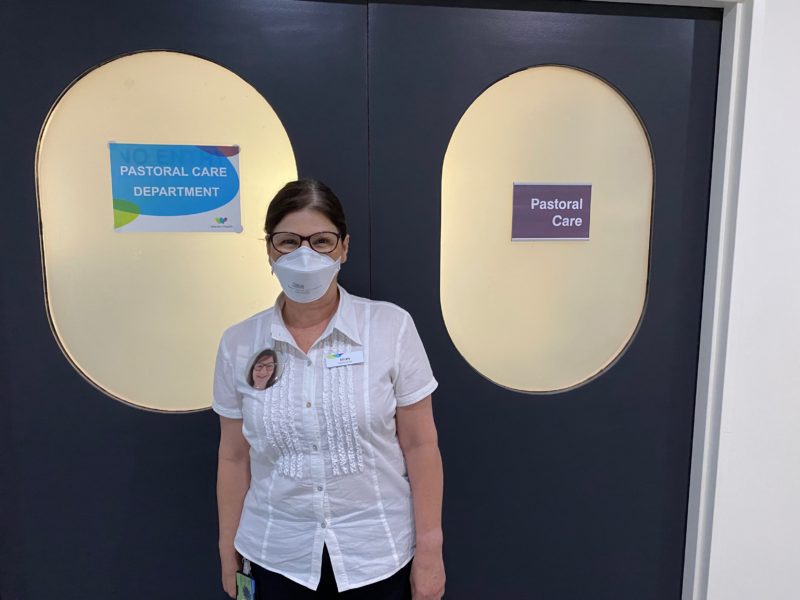Published on 10 February 2022
MARY ANASTASIOU
PASTORAL CARE PRACTIONER
Meet Pastoral Care Practitioner Mary Anastasiou who provides emotional support and spiritual guidance to patients and their loved ones and our staff.
What does Pastoral Care mean in a hospital setting?
Pastoral care is about coming alongside patients, their families and staff. It is spiritual and emotional support, it’s also about being a companion when someone is in a traumatic situation. It involves: lots of listening and validation, asking difficult questions, sitting with people who are often fearful and anxious, whether it because of news of a poor prognosis, or a new diagnosis. It’s accompanying them on their journey and supporting families and patients on the wards. We help them make sense of their suffering, normalise their grief and give them an opportunity to work through their feelings. We often tackle existential questions that need to be asked and not necessarily answered.
Most of our referrals are from staff via Electronic Medical Records (EMRs), telephone or in person. We provide support in person and over the telephone, often giving family and patients the chance to talk about their concerns and fears. Part of our role also involves arranging end of life blessing from different faiths and providing non-religious blessings or readings.
Recently I supported a gentleman with a brother in ICU, a mother on the ward and another brother in a different ICU. They all had COVID. I spoke to him several times. When one of the family members passed away, I arranged a priest for an end of life blessing. Then another family member, who was in hospital, was referred to the Pastoral Care team and I recognised the surname and I was able to support them with their grief. They were in so much pain, but they were so full of gratitude. I let them talk and validated their grief and suffering. During COVID, there are many patients and families who have had the added trauma of not being able to be together due to restrictions. We become their companions on their journey.
Tell us about the qualifications and experience you need to work in Pastoral Care.
You need a University Degree in Theology, Counselling or Social Work and a unit of Clinical Pastoral Education. I did a Counselling degree and I discovered Pastoral Care during my first placement at the Peter MacCallum Cancer Centre. Until then, I was planning to be a counsellor in the community.
You don’t need to have a faith to work in Pastoral Care, but it can help. We are respectfully across a range of religions and beliefs. We also have a list of external faith representatives that we can call upon, if required.
I have been working Pastoral Care for a decade and I love working at Western Health, it’s so multicultural. I am an Australian born Greek. The Greek patients love it when you speak to them and you can just see them relax. It’s a great team here; we all bring our own unique backgrounds and interests to our role and support each other.
How have you supported staff?
I personally find that when I am on the wards, I’ll often pick up when it is really stressful or frantic for staff. For instance, when there is a distressed patient or family member I can often sit with them, freeing staff up to do their clinical duties and if it’s a traumatic situation, I can also debrief with the staff later.
Our team works collaboratively with staff, patients and their families. For instance, a patient told me that they are scared of dying and wanted to understand what to expect, so I asked a doctor or nurse to have a conversation with them about what is likely to happen. It’s about giving patients and loved ones permission to ask questions and advocating for them.
Staff can also arrange support throughout Pastoral Care Manager Sacha McDonald, including: mindfulness, clinic hours for high acuity wards and targeted support for junior medical staff.
Can you please share with us one of the most rewarding moments in your career?
I came into a patient’s room and spoke to their sister who was in palliative care and also had mental health issues. She explained that her sister was very spiritual and would appreciate prayers. While I was in the room, the patient became very agitated; her sister asked if she wanted to pray. She consented and lay down on the bed. The sister left the room and I prayed with the patient. She became calm and I held her hand and she eventually fell asleep.
When the sister came back into the room, she was so moved by the fact that I was holding her hand and with tears in her eyes she thanked me for caring for her sister.
I also remember a recent encounter with a nurse who I have supported previously. I saw her one day on the ward and she said that it was so good to see me. She told me about an upsetting day and how she had found it helpful to debrief with me. Part of our role is to care for those who are caring for others. This is important, particularly during the pandemic.
We know that healthcare workers are very good at dealing with physical ailments, but often feel like they need to ”solider on” when it comes to their wellbeing, so they don’t always prioritise their own mental and spiritual needs, how can Pastoral Care help?
Staff can be reassured that we can offer confidential support. They are often at the centre of trauma, especially during COVID and they can benefit from talking to someone who is based in the hospital and who knows their work. Soldiering on is not always the best approach.
We all have our personal and professional loads to carry and COVID has amplified that. For example, palliative care staff have had the trauma of telling patients and their loved ones that visits are restricted. You may have a big Greek, Italian or Vietnamese family and they have six children, all with partners and grandchildren who have to say their goodbyes from the window with a family member on the phone by the patient.
I’ve been able to assist staff in these situations by being present and supporting the family, so that the nursing staff can carry on with their clinical duties. And I’ve had the opportunity to debrief with the nurses talk about how incredibly traumatic that process was. Talking to someone from the Pastoral Care team can relieve them of the load they are carrying. We can’t be there all the time, but when we are, we can really help patients and staff.
What do you enjoy about your role?
I love people and hearing their stories and supporting them on their journeys, it’s a privilege.
*Learn more about Pastoral Care, or contact the team here.
